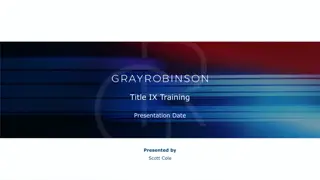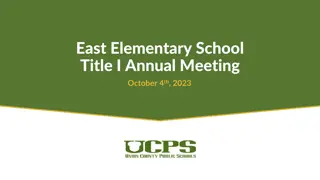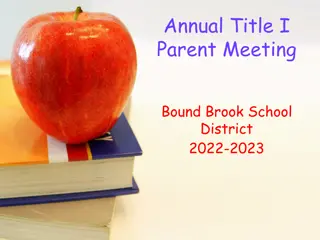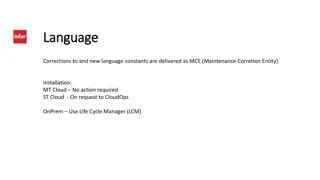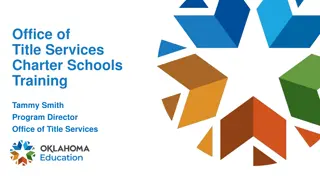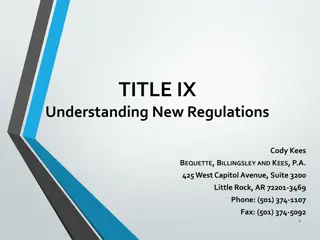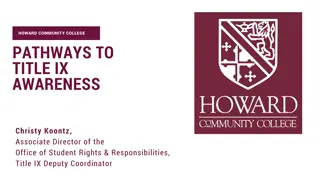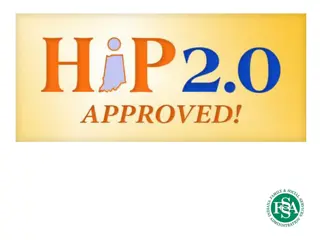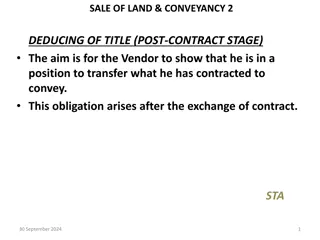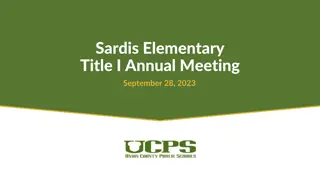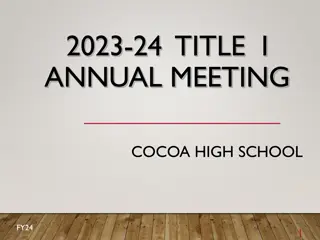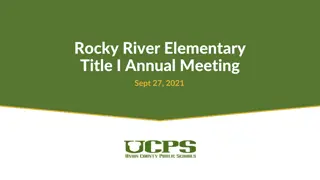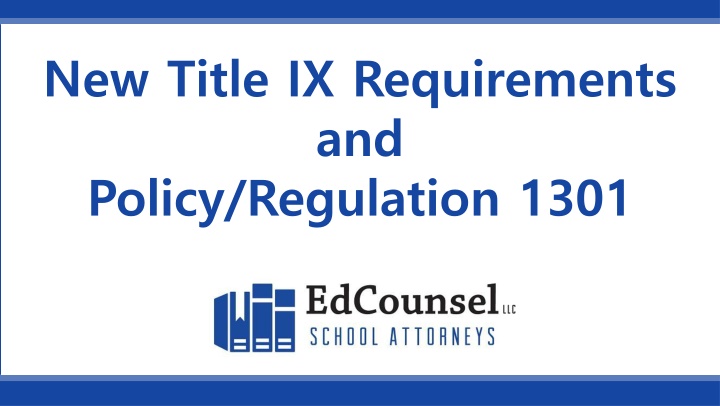
New Title IX Regulations and Policy Implementation Overview
Learn about the new Title IX requirements and policy regulations, effective from August 14, 2020, including the basic steps outlined in the regulations, definitions of terms such as actual knowledge and formal complaint, as well as the informal resolution process.
Download Presentation

Please find below an Image/Link to download the presentation.
The content on the website is provided AS IS for your information and personal use only. It may not be sold, licensed, or shared on other websites without obtaining consent from the author. If you encounter any issues during the download, it is possible that the publisher has removed the file from their server.
You are allowed to download the files provided on this website for personal or commercial use, subject to the condition that they are used lawfully. All files are the property of their respective owners.
The content on the website is provided AS IS for your information and personal use only. It may not be sold, licensed, or shared on other websites without obtaining consent from the author.
E N D
Presentation Transcript
New Title IX Requirements and Policy/Regulation 1301
New Title IX Regulations Effective August 14, 2020 Numerous procedural changes District will need to adopt policy and regulation 1301 or Prohibition Against Sexual Harassment and Retaliation under Title IX .
Basic Steps Outlined in the New Regulations District or school receives actual knowledge of conduct that may constitute sexual harassment. District-level or school-based Title IX Coordinator meets with alleged victim to discuss supportive measures and the process for filing a formal complaint. Investigator leads the investigation after the formal complaint is in place and written notice is given to the involved individuals and their parents/guardians.
Select Definitions Actual Knowledge Notice of sexual harassment or allegations of sexual harassment to any employee (other than the respondent) in an education program or activity of the District against a person in the United States. Actual knowledge does not include constructive notice.
Select Definitions Formal Complaint A document filed by a complainant, or a parent or legal guardian of a student complainant, alleging sexual harassment against a respondent and requesting that the District investigate the allegation of sexual harassment. Additionally, a formal complaint can be completed and signed by the Title IX Coordinator, if , in their sole discretion, they conclude that the District needs to conduct an investigation based on information in their possession, regardless of the complainant s interest in filing a formal complaint. At the time of filing a formal complaint, a complainant must be participating in or attempting to participate in the education program or activity of the District. The complainant must physically or digitally sign the formal complaint, or otherwise indicate that the complainant is the person filing the formal complaint. If the Title IX Coordinator signs a formal complaint, the Title IX Coordinator is not a complainant.
Select Definitions Informal Resolution Process Alternative dispute resolution methods designed to resolve allegations of sexual harassment without completing the formal complaint process. The purpose of the process is to restore or preserve equal access to the district's education programs or activities for all parties. Such a process may be offered by the Title IX coordinator after a formal complaint has been filed and after consultation with the district's attorney as to whether an informal resolution process will be sufficient to meet the district's Title IX obligations.
Select Definitions Sexual harassment under Title IX is conduct on the basis of sex within the scope of the district's education programs or activities that satisfies one or more of the following: A District employee conditioning an aid, benefit or service of an education program of the district on an individual's participation in unwelcome sexual conduct; Unwelcome conduct determined by a reasonable person to be so severe, pervasive and objectively offensive that it effectively denies a person equal access to the district's education program or activity; or "Sexual assault" as defined in 20 U.S.C. 1092(f)(6)(A)(v), "dating violence" as defined in 34 U.S.C. 12291(a)(10), "domestic violence" as defined in 34 U.S.C. 12291(a)(8) or "stalking" as defined in 34 U.S.C. 12291(a)(30).
Select Definitions Sexual assault is an offense classified as forcible or nonforcible sex offense under the uniform crime reporting system of the Federal Bureau of Investigation.
Select Definitions Sexual offenses are any sexual act directed against another person, without consent of the victim, including instances where the victim is incapable of giving consent, and unlawful sexual intercourse. This includes rape, sodomy, sexual assault with an object, fondling, incest, statutory rape, and failure to register as a sex offender.
Select Definitions Dating violence is violence committed by a person who is or has been in a social relationship of a romantic or intimate nature with the victim. The existence of such a relationship shall be determined based on a consideration of the following factors: The length of the relationship The type of relationship The frequency of interaction between the persons involved in the relationship.
Select Definitions Domestic violence is a felony or misdemeanor crime of violence committed by: A current or former spouse or intimate partner of the victim, by a person with whom the victim shares a child in common; A person who is cohabitating with or has cohabitated with the victim as a spouse or intimate partner; A person similarly situated to a spouse of the victim under the domestic or family violence laws of Missouri; or Any other person against an adult or youth victim who is protected from that person s acts under the domestic or family violence laws of Missouri.
Select Definitions Stalking is engaging in a course of conduct directed at a specific person that would cause a reasonable person to: Fear for his or her safety of others; or Suffer substantial emotional distress.
Select Definitions MCE Regulation 1301 examples: sexual advances; request for sexual favors; threatening an individual for not agreeing to submit to sexual advancement; sexually motivated touching of an individual s intimate parts; coercing, forcing, or attempting to coerce or force the touching of an individual s intimate parts; display of drawings, graffiti, cartoons, pictures, symbols or other written material of a sexual nature; sexual gestures; sexual or dirty jokes; sexually provocative or explicit speech; communications about or rating an individual as to their body, sexual activity, or performance; and verbal abuse of a sexual nature.
Schools Must . . . Provide for the prompt and equitable resolution of student and employee complaints. Treat complainants and respondents equitably. Require an objective evaluation of all relevant evidence. Require that Title IX Coordinator, Investigator, Decision-maker, or any other key player have no conflicts of interest or bias for or against complainants or respondents, and that all such individuals receive specified professional development. Include a presumption of innocence for respondents.
Schools Must . . . Include a presumption of innocence for respondents. Designate reasonably prompt time-frames for resolution and the range of possible disciplinary actions. Use either the preponderance of the evidence or clear and convincing standard and apply it equally to employee and student complaints. Provide complainant and respondent (and their parents/guardians) an equal opportunity to review any evidence obtained that is directly related to the allegations raised in a formal complaint. Address certain other procedural steps enumerated at 34 C.F.R. 106.45 of the new regulations.
Roles and Responsibilities Investigator gathers and reviews evidence, and prepares an investigative report; the involved individuals and their parents/guardians review and respond to the report. Decision-maker provides opportunity for involved individuals and their parents/guardians to prepare written questions to be answered by the other side. Decision-maker reviews all materials and makes a written responsibility determination an impartial determination as to whether the alleged conduct occurred including sanctions.
Identify the Roles Since multiple individuals are needed to fill the roles in the process, it is important to establish the roles at the onset. Title IX Coordinator can be the investigator. Decision-maker must be someone other than the Title IX Coordinator or Investigator. Appeal decision-maker cannot be the same person as the decision-maker, the investigator, or Title IX Coordinator. Title IX has specific training requirements for individuals filling these roles, which will be covered by this training.
Reporting Requirements Any person may report sexual harassment regardless of whether the person is the alleged victim(complainant). However, Board members and employees must immediately report to the Title IX coordinator any incident or behavior that could constitute sexual harassment or retaliation in accordance with this policy. Reports may be made at any time, including during nonbusiness hours, by using the telephone number, email address or office address listed below.
Intake and Classification of Reports The Title IX coordinator will receive and review all reports of sexual harassment even if a formal complaint has not been filed. If the Title IX coordinator determines that the report concerns conduct that does NOT involve sexual harassment under Title IX as that term is defined in policy/regulation or did not occur in the district's education program or activity, the Title IX coordinator should use the grievance process in policy/reg 1300 or forward the complaint to the individual responsible for implementing policy/reg 1300.
Basic Steps If a school has actual knowledge of sexual harassment allegations, the school must respond promptly and in a manner that is not deliberately indifferent (i.e., not clearly unreasonable in light of the known circumstances ). A school must offer supportive measures to the alleged victim (complainant) and follow a grievance process that meets certain minimum requirements before imposing discipline or other actions that are not supportive measures against an alleged perpetrator (respondent). A school may not continue with the grievance process in the absence of a formal complaint.
Supportive Measures Supportive Measures Non-disciplinary, non-punitive, individualized services. Appropriate supportive measures shall be offered to the complainant and may be offered the respondent, as appropriate and depending on the individual circumstances of the situation. Supportive measures may include, but are not limited to, physical separation, contact limitations, reassignment, alternative work or assignments, altering class or bus seating assignments, additional supervision, counseling, training, and conferences.
Removal of Respondent The district is not precluded from removing a Respondent from the education program or activity on an emergency basis, provided that the district: Determines that an immediate threat to the physical health or safety of any student or other individual rising from the allegations of sexual harassment justifies removal; and Provides the Respondent with notice and an opportunity to challenge the decision immediately following the removal. (Perform an individual safety and risk assessment) The requirement of supportive measures does not preclude the district from placing an employee on administrative leave during the grievance process. Keep in mind disciplinary requirements under policy and state law as you work through this process.
Procedures Prior to or without a Formal Complaint When the Title IX coordinator has actual knowledge of an allegation of sexual harassment under Title IX in an education program or activity of the district, the Title IX coordinator will promptly contact the complainant and: Discuss the availability of supportive measures. Consider the complainant's wishes with respect to supportive measures. Explain the process for filing a formal complaint under this Regulation. Inform the complainant of the availability of supportive measures regardless of whether a formal complaint is filed
In Absence of Formal Complaint If no formal complaint is filed by the complainant or signed by the Title IX coordinator, no disciplinary action will be taken against the respondent on the grounds of sexual harassment under Title IX.
The Formal Complaint Process The complainant may file a formal complaint or choose not to file a formal complaint and simply receive the supportive measures. If the complainant does not file a formal complaint, the Title IX coordinator may sign a formal complaint initiating the grievance process. The Title IX coordinator will do so only if initiating the grievance process against the respondent is not clearly unreasonable in light of the known circumstances.
Confidentiality The District will respect the privacy of the complainant, the respondent, and the witnesses to the extent possible, consistent with applicable law as well as the District s legal obligations to investigate, to take appropriate action, and to conform with disclosure obligations as identified in this Regulation. The complainant and the respondent shall not disclose any information obtained during the grievance process in violation of the Family Educational Rights and Privacy Act or for any purpose outside of participation in the grievance process.
Title IX Grievance Process upon Filing of a Formal Complaint During the grievance process for a formal complaint, the District shall: Treat the complainant and the respondent equitably. Ensure that relevant evidence is objectively evaluated, including both inculpatory and exculpatory evidence, and that credibility determinations are not based on a person s status as a complainant, respondent, or witness. Title IX Coordinator, the investigator, all decision-makers, and any facilitator of the informal resolution process shall not have a conflict of interest or bias for or against complainants or respondents generally or individually. The District shall not require, allow, rely upon, or otherwise use questions or evidence that constitute, or seek disclosure of, information protected under a legally recognized privilege, unless the person holding such privilege has waived the privilege.
Title IX Grievance Process upon Filing of a Formal Complaint (cont.) Presume that the respondent is not responsible for the conduct until a determination of responsibility is made at the conclusion of the grievance process; Follow stated timeframes and deadlines May be extended by the District for good cause, including but not limited to Board approved holiday breaks and building closures.
Notice to the Parties When the complainant files a formal complaint, written notice will be provided to all known parties and will include: Notice of the grievance process, including any informal resolution process that is available and the timeline for such process. Notice of the allegations of sexual harassment under Title IX made by the complainant with sufficient details known at the time and with sufficient time to allow the respondent to prepare before the initial interview. At a minimum, the details will include the identities of the parties involved in the incident, if known, the conduct and the date and location of the alleged incident if known. A statement that the respondent is presumed not responsible for the conduct and that a determination of responsibility will be made at the conclusion of the grievance process.
Notice to the Parties (cont.) A statement that parties may have an advisor of their choice, who may be an attorney. A statement that the parties and their advisors will have an equal opportunity to inspect and review any evidence that is directly related to the allegations raised in the formal complaint, including evidence upon which the district does not intend to rely, so that each party can meaningfully respond to the evidence prior to conclusion of the investigation. Notice of any provision in the district's discipline code that prohibits knowingly making a false statement or providing false information during the grievance process. If in the course of the investigation of sexual harassment under Title IX the district decides to investigate allegations about the complainant or respondent that were not in the initial notice, notice of the additional allegations will be provided to all known parties.
Investigation Process and Scope After the formal complaint is filed, the investigator will provide an investigative report to the decision-maker. The investigation may be conducted by someone other than the Title IX coordinator. Note MCE 1301: Title IX Coordinator IS the investigator unless designee is assigned. Initiate investigation within 5 days The investigator will gather evidence sufficient to reach a determination of responsibility or nonresponsibility and may not require the parties to do so.
Investigation Process and Scope (cont.) During the investigation and the grievance process, the district will: Provide an equal opportunity for the complainant and the respondent to present witnesses and evidence; (including inculpatory and exculpatory evidence) Not restrict the ability of either the complainant or the respondent to discuss the allegations under investigation or to gather and present relevant evidence; Refrain from requiring, allowing, relying upon, or otherwise using questions or evidence that seek disclosure of information protected under a legally recognized privilege unless such privilege has been waived; Provide the complainant and the respondent with the same opportunities to have an advisor present during any grievance proceeding; Provide to the complainant and the respondent whose participation is requested written notice of the date, time, location, participants, and purpose of all investigative interviews, or other meetings, with sufficient time for the individual to prepare to participate; Provide the complainant and the respondent an equal opportunity to inspect and review any evidence directly related to the allegations in the formal complaint; Includes evidence that the District doesn t intend to rely upon to reach determination, regardless of where the evidence was obtained from Result in the creation of an investigative report that fairly summarizes relevant evidence.
Investigation Process and Scope (cont.) Prior to the completion of the investigative report, the investigator shall send to the complainant and the respondent the evidence related to the investigation to inspect and review. The complainant and the respondent shall have ten (10) days to submit a written response which the investigator shall take into consideration in creating the final investigative report. At the close of the investigation, a written final investigative report will be delivered to the complainant and the respondent. The final investigative report should be completed within thirty (30) days of the initiation of the investigation, unless good cause exists to extend this timeframe. Upon receipt of the final investigative report, the complainant and the respondent shall have ten (10) days to submit a written response to the report to the investigator and to submit written, relevant questions to be asked of any party or witness prior to the determination of responsibility.
Dismissal of the Formal Complaint The Title IX Coordinator must dismiss a formal complaint for any of the following reasons: The conduct alleged in the formal complaint would not constitute sexual harassment even if proved. The conduct alleged in the formal complaint did not occur in the District s education program or activity. The conduct alleged in the formal complaint did not occur within the United States. The Title IX Coordinator may dismiss a formal complaint for any of the following reasons: The complainant has notified the District in writing that the complainant would like to withdraw the formal complaint or any allegations. The respondent is no longer enrolled or employed by the District. Specific circumstances prevent the District from gathering evidence sufficient to reach a determination as to the formal complaint.
Dismissal of the Formal Complaint (cont.) If the Title IX Coordinator dismisses a formal complaint: written notice of the dismissal, including the reasons for dismissal, shall be provided to the complainant and the respondent. If a complainant or respondent wishes to appeal a dismissal of a formal complaint, they should follow the appeal process outlined in this Regulation. Dismissal of a formal complaint does not preclude the District from investigating, taking action, or imposing discipline outside of this Regulation related to the alleged conduct and in accordance with any other Board policy or regulation
Submission for a Determination of Responsibility and the Related Findings and Conclusions MCE 1301: Superintendent, or designee, is decision-maker The designated person may be a district administrator, an attorney or another appropriate adult. The person designated cannot have been part of the investigation Cannot be the Title IX Coordinator Preponderance of the evidence standard is used to make determination.
Submission for a Determination of Responsibility and the Related Findings and Conclusions The decision-maker shall receive the final investigative report as well as any written responses and additional questions to be asked that were timely submitted by the complainant and the respondent. Upon a determination of relevance, the decision-maker will facilitate the exchange of written questions as submitted by the complainant and the respondent Provide the complainant and the respondent with submitted answers (if any), Allow for additional, limited follow-up questions from the complainant and respondent. Within a reasonably prompt time frame, the decision-maker shall make a determination of responsibility based on the final investigative report, the evidence, and all written responses timely submitted by the complainant and the respondent, and without any live testimony or hearing.
Submission for a Determination of Responsibility and the Related Findings and Conclusions The decision-maker shall provide the written determination to the complainant and the respondent, along with information regarding the procedures and allowable bases to appeal the decision. The written determination shall include: The allegations potentially constituting sexual harassment; A description of the procedural steps taken from the receipt of the formal complaint through the determination, including any notifications to the parties, interviews with parties and witnesses, site visits, and methods used to gather other evidence; Findings of fact supporting the determination; Conclusions regarding the application of the District s code of conduct to the facts; and A statement of, and rationale for, the result as to each allegation, including a determination regarding responsibility, any disciplinary sanctions the District imposes on the respondent, and whether remedies designed to restore or preserve equal access to the District s education program or activity will be provided by the recipient to the complainant.
Initiating an Appeal of a Title IX Decision Time, Contents and Assignment Either party may appeal the determination(s) of responsibility, the dismissal of a formal complaint or any allegation in a formal complaint by notifying the Title IX coordinator in writing within 5 days of the parties receiving the written Title IX decision from the decision-maker. Appeals must be based on one or more of the following: A procedural irregularity that affected the outcome of the investigation. New evidence that was not reasonably available at the time of the determination and that could affect the outcome of the investigation. The Title IX coordinator, investigator(s) or decision-maker(s) had a conflict of interest
Appeals If an appeal is filed, the Title IX coordinator will: Assign the appeal to an appellate decision-maker who is not the same person as the initial decision-maker, the investigator or the Title IX coordinator. Notify other parties in writing. Implement the appeals process equally to all parties. Give all parties the opportunity to submit a written statement in support of or challenging the outcome
Appeals The appellate decision-maker will review the findings of the initial decision-maker and review the written statements filed by the parties supporting or opposing the appeal. The appellate decision-maker will issue a written decision describing the result of the appeal and the rationale for the result to all parties. The determination of the appellate decision- maker is final.
Process for Informal Resolution of Formal Complaints At any time after a formal complaint is filed and prior to reaching a determination regarding responsibility, the District may facilitate an informal resolution process to address the allegations made in the formal complaint. The informal resolution process is voluntary and does not involve a full investigation and adjudication under the grievance process in this Regulation. If the complainant and respondent both elect to engage in the informal resolution process, their voluntary consent shall be made in writing and all timeframes and deadlines in this Regulation shall be suspended.
Process for Informal Resolution of Formal Complaints An informal resolution may include, but is not limited to the following: If the complainant so desires, an opportunity for the complainant to explain to the respondent that his or her conduct is unwelcome, offensive or inappropriate, either in writing or face-to-face; A statement from a staff member to the respondent that the alleged conduct is not appropriate and could lead to discipline if proven or repeated; Developing a safety plan; Separating students; or Providing staff and/or student training. The informal resolution process shall not be made available to formal complaints alleging sexual harassment under this Regulation of a student by an employee.
Training for Title IX Coordinators, Investigators, Decision-Makers These individuals must receive training on: Definition of sexual harassment (previously covered) The scope of the District s education program or activity How to conduct an investigation and grievance process (previously covered) How to serve impartially (avoiding prejudgment of the facts, conflicts of interest, bias)
Training for Investigators Investigators must receive additional training on issues of relevance to create an investigative report that fairly summarizes relevant evidence.
Training for Decision-Makers Decision-Makers must receive additional training on issues of relevance of questions and evidence, including sexual predisposition and prior behavior not relevant
Scope of the Districts Program or Activity Education program or activity includes locations, events, or circumstances over which the District exercised substantial control over both the Respondent and the context in which the sexual harassment occurs. Title IX obligations extend to sexual harassment incidents that occur off campus if either of these conditions are met: If the off-campus incident occurs as part of the recipient s operations pursuant to 20 U.S.C. 1687 and 34 CFR 106.2(h), which is all of the operations of a local education agency, or If the recipient exercised substantial control over the respondent and the context of alleged sexual harassment that occurred off campus pursuant to 106.44(a) Considered whether sexual harassment occurred in a district s education program or activity by examining factors such as whether the recipient funded, promoted, or sponsored the event or circumstance where the alleged harassment occurred.
How to Serve Impartially Avoiding Prejudgment of the Facts Prejudgment generally is to judge before a full and sufficient investigation. Do not make assumptions or judgments about the parties. Hear all of the facts from the parties and witnesses. Findings of facts and decisions are to made on the basis of individualized facts and not on stereotypical notions of what men or women do or do not do. Do not make assumptions about situations of sexual assault. Complainant cried so she s telling the truth. Complainant was drinking so she can t remember. Men are aggressive and likely to sexually assault. Men cannot be sexually assaulted. Women have regrets and lie about sexual assault. Respondent has been sexually active with Complainant before so he couldn t have sexually assaulted Complainant. Keep an open mind and seek additional information if you jump to conclusions. Communicate facts in the investigation report, not conclusions.
How to Serve Impartially - Avoiding Bias Bias generally is an inclination of temperament or outlook. Bias is based on stereotypes and not facts. Facts, credibility determinations, and decisions cannot be based on an individual s sex, race, ethnicity, sexual orientation, gender identity, disability or immigration status, financial ability, or other characteristic. Implicit bias are attitudes or stereotypes that affect our understanding, actions, and decisions in an unconscious manner. Everyone has them even if they don t align with declared beliefs. Question your thinking throughout this process. Most evidence will be circumstantial rather than direct. Be aware how comments you ve made can be used to claim prejudgment and bias. My daughter would not go out of the house looking like that. Females who dress like that are just asking for it.
How to Serve Impartially Avoiding Conflict of Interest Conflict of interest generally is a real or seeming incompatibility between one s private interests and one s public or fiduciary duties and the private interests compromise one s judgment and decisions. Can arise from family relationships, friendships, colleague relationships, romantic relationships, financial investments, etc. Keep this in mind when assigning individuals to the roles of investigator, decision-maker, appeal decision-maker, especially in smaller districts. Also be aware of perceived or potential conflicts of interest, and determine if the process should proceed with them in a particular role. Bottom line - must be able to serve impartially.

